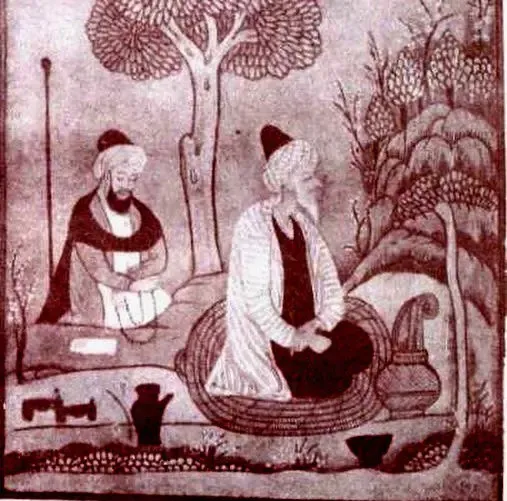Controversy Surrounds Omission of Kashmir's Revered Saint from School Curriculum

Srinagar/New Delhi, Dec 30 (NationPress) When efforts are made to protect cultural heritage, one might expect the traditional values that promote inclusivity and broad-mindedness to serve as guiding lights amidst tumultuous circumstances—but what transpired in Kashmir was quite the opposite. The act itself spoke volumes and provoked assertive responses.
The alteration of a school curriculum was labeled as "blue-pencilling" and deemed "cultural terrorism." The exclusion of a chapter dedicated to Sheikh-ul-Alam from the English syllabus for class 9 faced vehement backlash.
Mohammed Yousuf Tarigami, the CPI-M MLA from Kulgam in south Kashmir, expressed that it was "deeply troubling to see an entire chapter on the revered Sufi saint Sheikh-ul-Alam omitted from Class IX textbooks."
In light of this development, he took to X to state, "This blue-pencilling, done prior to the Assembly elections, is unacceptable for a society grounded in rich Sufi traditions."
He called upon Chief Minister Omar Abdullah to "intervene and ensure the reinstatement of this significant chapter, thereby honoring and preserving our rich cultural and Sufi heritage."
Who exactly was Sheikh-ul-Alam?
A Sufi saint named Sheikh Noor-ud-Din Wali, believed to have been born in 1377 in present-day Kulgam, was a mystic, poet, and Islamic preacher who had considerable influence over the populace. Recognized as one of the founders of the Rishi order in Kashmir, he earned the title of ‘Sheikh-ul-Alam’, which translates to spiritual guide of the world.
He is also affectionately known as Nund Rishi. "Nund means beautiful in Kashmiri," noted G. N. Adfar, the author of ‘The Alchemy of Light,’ a trilogy that translates the verses of this mystic poet into English, during a conversation with IANS.
"He lived 700 years ago. Kashmir has not seen another Nund Rishi," he added. "There is not a single household in Kashmir—be it Muslim or non-Muslim—where people do not recognize Nund Rishi, as his teachings are universal and not confined to a particular sect," he continued.
He elaborated that Rishis were individuals who isolated themselves in forests, dedicated to the worship of God. With the rise of Sufism, a fundamental shift in perspective emerged, acknowledging that the profound wisdom held by these sages was intended for the common people, necessitating their return to society for meaningful interaction.
Thus, the Rishi era marked a return of these sages to share their insights with the masses, as wisdom is meant to be utilized for the collective betterment of humanity.
Although not entirely at odds with mainstream beliefs, the teachings of the Rishi emphasized transcending ordinary religious practices dictated by clergy, directing focus instead to the spiritual realm of faith.
However, Kashmir has undergone numerous significant transformations over the past seven centuries. Despite these changes, Adfar asserts the continued relevance of this saint in today's context.
"Great individuals remain great," he affirmed. "His teachings are for all humanity, and what was right for humanity in the past will always hold true," he stated.
Recalling one of Nund Rishi's enduring messages, Adfar mentioned that during the UN Conference on Human Environment in 1972, former Prime Minister Indira Gandhi referenced a verse by Nund Rishi that translates as "food is secure as long as forests are preserved."
Emphasizing the importance of personal justice towards others, the author explained that the saint taught that faith in the Almighty combined with a spirit of justice is far superior to mere ritualistic prayers.
The international airport in Srinagar is named in honor of this saint. In 2006, a year after the airport received international status, the defense airport was renamed Sheikh-ul-Alam International Airport. In 2020, there was a proposal to rename the airport after Major Somnath Sharma, who lost his life defending this airport in November 1947 against invading Pakistani militia, making him the first recipient of India's highest military honor, the Param Vir Chakra.
Controversy over the school book
Sajad Gani Lone, a legislator from the Jammu & Kashmir People's Conference and a key opposition figure, strongly criticized J&K’s Board of School Education (BOSE) for the removal of the chapter on Kashmir’s patron saint.
On X, Lone remarked: "BOSE has removed a chapter detailing the saintly life of the highly esteemed Sheikh Noor-ud-Din Wali from the class 9 textbooks."
"We have all revered him, and individuals of all faiths hold him in the highest regard. This is pure cultural terrorism. It is an assault on our culture and ethos. I, as a Kashmiri, firmly condemn this," he declared.
Highlighting the significance of the Sufi saint and his lasting influence on Kashmiri culture, Lone stated: "Now more than ever, our times are tainted by violence, greed, and hatred. In such times, our great Saint serves as a beacon of hope and a role model. For those responsible for BOSE's decision—our great saint and his teachings were ingrained in our hearts and minds long before BOSE was established."
IANS made several attempts to contact the relevant authorities at BOSE, but in the absence of an authoritative response, it remains unclear why this decision was made and what led to its potential reversal.
What may seem like a simple alteration to the J&K state board’s syllabus is perceived as a more significant issue with far-reaching consequences in the broader context of recent events, as noted by valley-based writer and activist Mushtaq Sikandar.
He likens it to changes occurring in other regions of India, where "Muslim history is being systematically erased from textbooks." It is alleged that a similar policy is being implemented in Kashmir.
"This is also considered an assault on our cultural identity," he stated. However, chapters on Nund Rishi remain in the Kashmiri and Urdu language curricula for other grades. Yet, the removal of this lesson from the English syllabus is viewed as an effort to "Hinduize Kashmiri society," according to Sikandar.
"There is a prevailing fear among the public that demographic changes planned over an extended period aim for the Hinduization of Kashmiri culture," he remarked, referencing significant historical events like the Amarnath land row (2008) and the abrogation of Article 370 (2019), along with systematic alterations such as allocating land leases and hotel contracts in the popular tourist spots of Pahalgam and the Srinagar smart city project to outsiders.
Discussing public sentiment, the critic explained that state institutions are perceived to be working towards "de-Islamizing" the region and fostering an atmosphere of fear for Muslims, as this is how the average Kashmiri perceives the situation.
"Yet, resistance is not overt, as state agencies have been under the Central government’s influence for years," Sikandar pointed out, adding that "The undercurrent of Right-wing Hindu ideology is rendering the Omar Abdullah government powerless."
Nonetheless, following objections raised from various political factions, the Chief Minister announced that the chapter would be reinstated. It remains to be seen whether the textbooks will reveal any surprises when the academic session resumes in March after the winter break.
For a society that holds such deep reverence for a saint, whose values are expected to permeate Kashmiri ethos regardless of educational curriculum or faith, how significant is the symbolism of a chapter in a school book?
"It is an ethical obligation to pass on the wisdom of great individuals, our ancestors, to younger generations so that they can live by their teachings. Therefore, it deserves a place in the curriculum, just as Gandhi ji is known to all, regardless of textbook chapters about him," remarked senior scholar Adfar.
(Kavya Dubey may be reached at kavya.d@ians.in)








